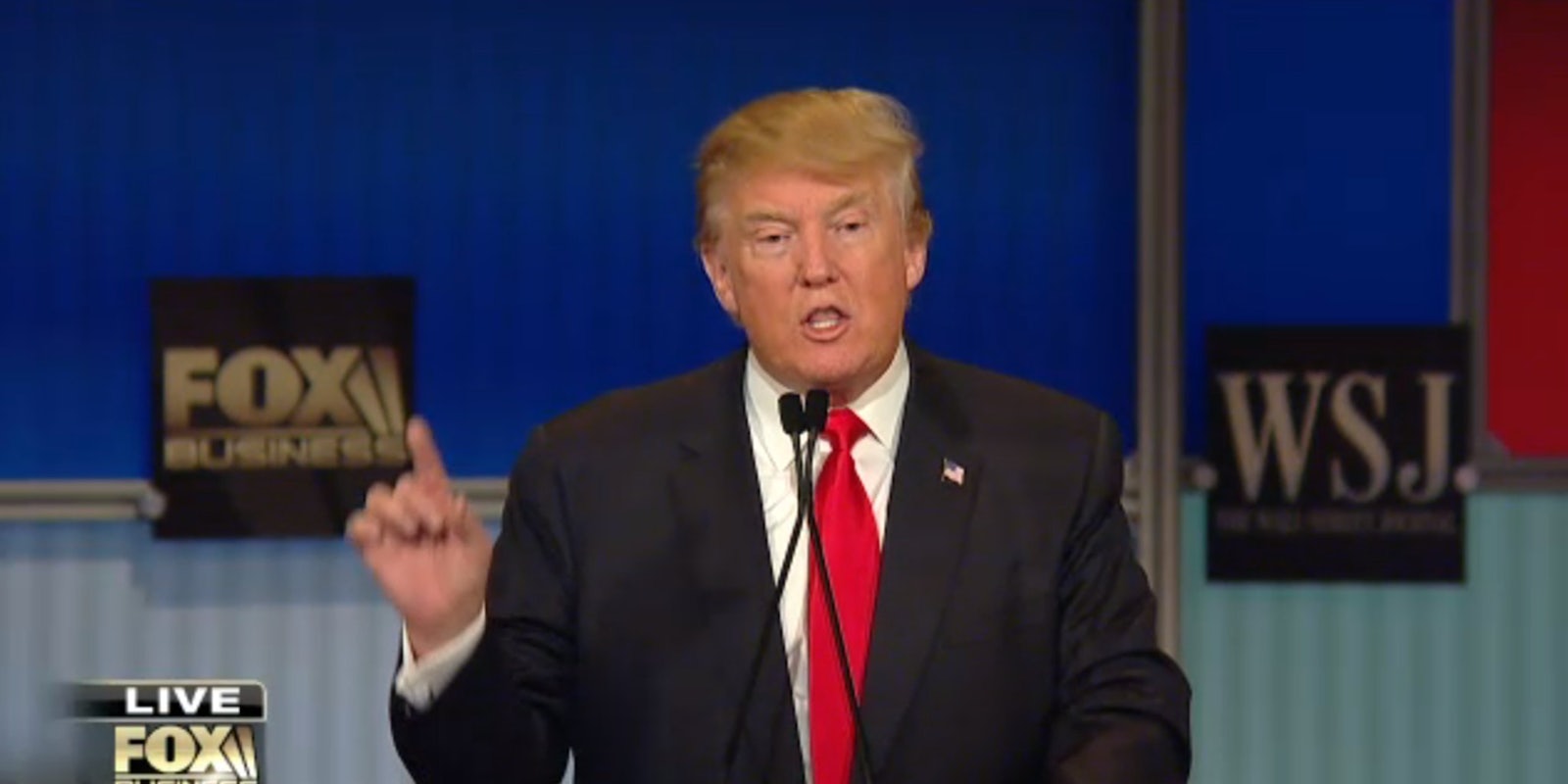When were the Republican presidential candidates telling the truth and when did they get it wrong during Tuesday night’s debate?
A total of 12 White House hopefuls took the stage Tuesday in a debate that ranged from the economy to terrorism, China to ISIS, and from the Trans-Pacific Partnership to the Iran nuclear deal.
The eagle means business. #GOPDebate pic.twitter.com/6pcp5vL85a
— Layer 8 (@dotlayer8) November 11, 2015
Here are our fact-checks on what the candidates said from Tuesday night’s debates.
American industry
Gov. Mike Huckabee began the night with a sentiment that’s familiar to anyone following the Republican campaign: American industry’s downward spiral.
Fact check: True. (Source: BLS data) #GOPDebate pic.twitter.com/06dbWGEEah
— Layer 8 (@dotlayer8) November 11, 2015
Huckabee’s statement on American manufacturing jobs being lost is true. There is, however, an important caveat that he didn’t mention—the numbers are up since 2010, reversing a precipitous decline.
High taxes
Gov. Chris Christie, who focused in on Hillary Clinton all night, bemoaned Democratic plans that he says will increase your taxes to 90 percent.
Fact check: False. https://t.co/ON11MGDdJk #GOPDebate pic.twitter.com/weJWykXulm
— Layer 8 (@dotlayer8) November 11, 2015
Sanders, meanwhile, has said no such thing.
He has pointed out that America’s very richest citizens were taxed at a marginal rate of 90 percent under Republican president Dwight Eisenhower.
Wages
While Huckabee repeatedly argued that America’s economy was on a long-term economic downward trend, he pointed to stagnant wages for American workers.
Fact check: True. https://t.co/6A8gXRlDUg #GOPDebate pic.twitter.com/RyQmSx5Fvj
— Layer 8 (@dotlayer8) November 11, 2015
It’s true. Adjusted for modern dollars, Americans haven’t had a raise in decades. Gov. Jeb Bush noted that most of the jobs created since the U.S. economy began recovering from the recession have been lower-wage jobs. That’s accurate.
Fact check: True. https://t.co/HWOwaujAaM #GOPDebate pic.twitter.com/Gw5tbUpkm5
— Layer 8 (@dotlayer8) November 11, 2015
Donald Trump, the frontrunner of the race, struck a more dire tone when he said the country is losing jobs like never before.
Fact check: False. https://t.co/RXrizeffcT #GOPDebate pic.twitter.com/h9aS4VNe7V
— Layer 8 (@dotlayer8) November 11, 2015
That’s not accurate. The U.S. is gaining jobs, first of all. In the larger picture, American unemployment was higher during the Great Depression and numerous other periods in history since.
Small businesses
As evidence of his claim that the American economy is shrinking for most people, Gov. Jeb Bush said that more small businesses close every month than open.
Fact check: False. https://t.co/uf6OhUqXGF #GOPDebate pic.twitter.com/HLiRVh2xSk
— Layer 8 (@dotlayer8) November 11, 2015
U.S. Small Business Administration statistics show that, in fact, the numbers of small businesses opening and closing every year are just about equal: About 10-to-12 percent.
Minimum wage
When asked about those at the very bottom of the wage ladder, Dr. Ben Carson said he would not raise the minimum wage if elected.
Fact check: False. https://t.co/Z1PYhlzkDc #GOPDebate pic.twitter.com/5nTkkZunMD
— Layer 8 (@dotlayer8) November 11, 2015
The reason, he argued, was that the minimum wage actually increases unemployment. Research shows that claim is false.
Income inequality
Attempting to flip a common trope on its head, Sen. Rand Paul (R-Ky.) said that Democrats are worse on income inequality than Republicans, pointing to cities as evidence.
Fact check: Misleading. https://t.co/LLXrEbDoDv #GOPDebate pic.twitter.com/ALM29ViKJB
— Layer 8 (@dotlayer8) November 11, 2015
It’s true that the most unequal cities tend to be Democratic-led and the most equal are Republican. The question, then, is can we credit or blame mayors for a city’s economy?
“No—many factors play into a city’s economic success,” Politifact reported. “The mayor of Detroit doesn’t have much power over the international market for automobiles, and no mayor of New York can take all the credit for the economic juggernaut of Wall Street. While mayoral policies may have an effect on the margins, such factors as the state and national business cycle, broad demographic patterns and international business trends tend to have a much greater impact on economic inequality in cities.”
Hacking
Christie attacked President Obama‘s handling of national security and, in particular, he pointed to cyberattacks launched by China against the U.S. government.
Fact Check: True. https://t.co/Nuz9XC9ZOr #GOPDebate pic.twitter.com/XHdogeC08U
— Layer 8 (@dotlayer8) November 11, 2015
Electability
One of Christie’s biggest qualifications, he insists, is his ability to win votes from both sides of the political spectrum.
Fact check: True. https://t.co/6kb64heUx6 #GOPDebate pic.twitter.com/NHaYSuWSCs
— Layer 8 (@dotlayer8) November 11, 2015
New Jersey does have more Democrats than Republicans, making this statement true.
Screenshot via Fox Business
